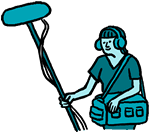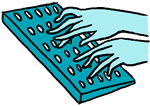Equipment
Museum shelving, stage lights, ceramic kilns, computers—our Cultural Equipment grants support these needs and more for King County’s cultural organizations.
These guidelines reflect information for last year’s grant cycle and will be updated ahead of applications opening for the next cycle. Please contact 4Culture staff with any questions.
Steps to Apply
1
What Cultural Equipment Funds
1
What Cultural Equipment Funds

Cultural Equipment grants fund the purchase and installation of equipment that can be considered as fixed assets, including computer hardware. You can request a minimum of $1,000 to a maximum of $10,000 for this grant. Applicants often receive partial funding of their request.
Criteria
We fund all of our grants through a competitive process, carefully evaluating each application.
For this particular grant, we’ll look to see how well your project shows the following:
- Quality: the reasoning behind your proposed equipment purchase, how carefully it has been planned, how it relates to your organization’s mission, and how central it is to the services your organization provides to King County residents and visitors.
- Feasibility: your ability to acquire and take care of the equipment, as demonstrated by a balanced project budget, access to a secure storage space, and the expertise of those who will select and maintain the equipment.
- Project impact: the impact of this specific equipment on your organization’s operations or the programs you offer to the community, and how the community will benefit from its use. Frequency of use is a factor, including shared use by multiple groups, but only if it makes sense for all groups.
- Advancing equity: purchasing and using this equipment will help your organization advance equity. You have described how your organization or programs are led by or will serve historically marginalized communities, especially those disproportionately impacted by structural racism. This is not a requirement for funding.
Public Benefit: Why It Matters
Every time a visitor to Washington State stays in a hotel, they pay a Lodging Tax—this is where our funding comes from – and our mission is to put it back into the community. As you work through your application, tell us exactly how your fellow King County residents will be able to enjoy and learn from your work. Read about public benefit more in depth here. Here are some ways you can provide public benefit with equipment:
- Use of the equipment to create free or low-cost performances, exhibitions, workshops, screenings, or readings, or to take care of collections that reflect all of King County’s residents.
- Use of the equipment by groups serving marginalized communities including, but not limited to, Black, Indigenous, and People of Color in King County, people with disabilities, people with low-incomes, youth and senior groups, residents in rural or suburban King County, and/or other historically marginalized groups.
- Use of the equipment to broaden your ability to reach individuals with disabilities or to make your programs or facility more accessible to them.
- Use of the equipment that prioritizes public health benefits (i.e., air filtration units, or equipment related to remote online programming)
- Sharing the equipment with other cultural groups at no cost or low cost.
Equity Investments
In order to combat inequities in our grantmaking, 4Culture has implemented Equity Investments. This practice incorporates indicators of structural inequity into our panel process, including geographic location, income, operating budget, audiences served, and project focus. By prioritizing these factors, we intend to more equitably distribute funds to communities that have historically been excluded from cultural funding.
Each of our grant programs implements an Equity Investment system tailored to the specific needs of its applicants; please read the After You Submit section of this page for details on how Equity Investments will function for this grant. This organization-wide practice—and what we learn about its impact—is an important step towards more equitable funding at 4Culture and throughout the King County cultural sector.
2
Are You and Your Project Eligible?
2
Are You and Your Project Eligible?

You
- Cultural Equipment grants are available for King County-based, tax-exempt, nonprofit cultural organizations and public agencies with a primary mission focus on arts, heritage, or preservation.
- You must have a legally-constituted board of directors, have no ongoing and continual deficits in your operating budget, and have the ability to demonstrate a minimum two-year operating history of offering public benefit to the residents of King County.
- If funded, you’ll be required to provide a W-9 form, sign a contract, and provide proof of liability insurance that names 4Culture as additional insured.
- Equipment purchased using these funds must be stored in a secure location.
- K-12 schools and school districts are not eligible for this grant.
- Equipment purchased with this grant may not be used for religious worship or instruction.
Your Project
Cultural Equipment funds may be used to pay for the following:
- Purchase of equipment that can be considered as fixed assets intended to be held for 10 years or more, such as machinery, equipment, or computer hardware.
- Installation fees if they are under 10% of your total request.
- Smaller items that are less than $200 per unit, if you demonstrate that the item is essential to the functionality of the larger equipment requested.
- Your total request should be a minimum of $1,000 and no more than $10,000.
Cultural Equipment funds may not be used to pay for the following:
- Facility design, engineering, purchase, or remodeling of a facility.
- General equipment maintenance or repairs.
- Installation fees that are over 10% of your total request.
- Purchase of materials and supplies that are less than $200 per unit and have expected useful life of less than 12 months, such as lightbulbs and small tools.
- Purchase of warranties, subscriptions, or computer software.
- Items purchased before December 7, 2023.
- Fees directed to staff unless their work on the project is outside their regular job duties and payment is above and beyond their regular compensation structure.
3
Helping You Succeed
3
Helping You Succeed

Workshops
Workshops can make a significant difference in the success of your application. We find that the strongest applications often come from people who have attended a workshop! All workshops will be held remotely. Please register via the links provided to receive Zoom meeting information.
This grant is currently closed. Workshops will be posted 6-8 weeks before the next deadline date.
If you are unable to attend a workshop, this workshop recording is available for you to view:
Tutorial Video
Watch this step-by-step application tutorial video to assist you through the process of creating an account, starting your application, and saving it for later.
Resources
View last cycle’s Arts, Heritage and Preservation applicants on our Past Grants page. This worksheet is available to help you with your application. Download the worksheet: Word or PDF
You can also read through the application questions before getting started:
- Project Description: clearly describe your organization’s intentions to acquire equipment and explain why this is a priority for your organization this year. It’s great to be concise. This is the who, what, when, where, and why of your project.
For example:
What is the equipment you need to purchase?
Where will the equipment be kept, and where and how often will it be used?
Is the equipment needed to enhance your operations and efficiency, or allow you to serve your audience or community better?
Will the acquisition of this equipment allow you to launch a new project or do something that you can’t do now? - Project Impact and Public Benefit: what effect will this project have on the community you serve? How will the successful purchase of the equipment affect your organization internally? How does this equipment allow you to execute your mission? Remember that we need you to provide some kind of public benefit in exchange for this funding. Is there a way the equipment can help you increase your public benefit activities?
- Advancing Equity: is your organization, or its programs, led by or serving historically marginalized communities, especially those disproportionately impacted by structural racism? How will this equipment allow you to better reach or serve historically marginalized communities? If these questions do not apply to your organization or this equipment acquisition, you may simply state so.
- Experience: summarize who is selecting the equipment and their relevant experience. (We do not need complete resumes.) How did they identify the appropriate equipment for this project (reached out to comparable institutions, consulted an expert, internal expertise)? What criteria did your organization use to select this equipment? How did your organization determine appropriate vendor and cost for equipment? By whom and how will this equipment be cared for during its lifespan?
- Implementation and Maintenance: provide a work plan for the purchase and use of this equipment, including planning, fundraising, purchase, first use, and regular maintenance. Who will have access to use this equipment? How will your organization maintain the equipment and will you insure it? Let panelists know your priorities if you are requesting multiple items, and how you would scale down the project if full funding is not received.
Contact
We’re here to help! Please contact us if you have a question about this program, or if you would like have your application draft reviewed by a 4Culture staff member.
Arts
Melissa Newbill
206-263-1603
Heritage
Megumi Nagata
206-263-3474
Preservation
Dana Phelan
206-263-1604
Translation and Assistance
The guidelines, a detailed explanation of how to apply, and the application are in English. If this is a barrier that stops you from understanding the grant or applying due to limited English writing ability, visual impairment, or you would like to request assistance to create an application, please contact or call (206) 296-7580 or TTY 711, and we will make sure you get the support you need.
Русский (Russian)
Руководство, подробная инструкция и форма заявки на английском языке. Если вам сложно разобраться в процедуре получения грантов или подачи заявок из-за ограниченных навыков письменного английского языка либо нарушений зрения, а также если вы бы хотели обратиться за помощью при составлении заявки, отправьте письмо на адрес электронной почты или позвоните по номеру (206) 296-7580 или 711 (телетайп), и мы позаботимся о том, чтобы вы получили необходимую помощь.
Soomaali (Somali)
Tilmaamaha, sharaxaadda faahfaahsan ee ku saabsan sida loo codsado, iyo waraaqda codsiga waxa ay dhammaan ku qoran yihiin Af-Ingiriisi. Haddii ay arrintani tahay caqabad kaa hor istaageysa fahamka deeqda ama codsashada oo ay sabab u tahay awoodda qorista Af-Ingiriisiga oo xadidan, araggaaga oo liita, ama aad jeclaan lahayd inaad codsato in lagaa caawiyo in aad codsi sameyso, fadlan la xiriir ama wac (206) 296-7580 ama TTY 711, waxaana xaqiijin doonnaa inaad hesho taageerada aad u baahan tahay.
Español (Spanish)
Las pautas, la explicación detallada de cómo enviar la solicitud y la solicitud están en inglés. Si esto le impide comprender la información relacionada con la beca o enviar una solicitud debido a una limitación en la capacidad para escribir en inglés, si tiene una discapacidad visual o si desea recibir asistencia para crear una solicitud, escriba a o llame al (206) 296-7580 o TTY 711, y nos aseguraremos de que obtenga la ayuda que necesita.
Tiếng Việt (Vietamese)
Hướng dẫn, giải thích chi tiết về cách nộp đơn va tài liệu áp dụng tất cả đều bằng Tiếng Anh. Nếu đây là rào cản khiến quý vị không hiểu được khoản trợ cấp hoặc cách nộp đơn do khả năng viết tiếng Anh hạn chế, do quý vị bị suy giảm thị lực hoặc muốn yêu cầu hỗ trợ để tạo đơn đăng ký, làm ơn liên hệ hoặc gọi (206) 296-7580 hay TTY 711 và chúng tôi sẽ hỗ trợ những gì quý vị cần.
4
After You Submit
4
After You Submit

Timeline
The deadline for this grant is August 30, 2023 at 5:00 pm PDT. Equipment requested through this grant program may not be purchased before December 7, 2023.
Panel Process
Every cycle of equipment proposals has a different pool of projects, and every grant is made by a panel consisting of working professionals in the fields we fund, and who represent all parts of King County, sizes of organizations, and different points of view. The panel comes together to talk about the proposals and recommends funding for selected proposals to 4Culture’s Advisory Committees and Board based on the criteria outlined above. The 4Culture Board then approves the final list of awards. Applicants will be notified soon after the Board’s approval, which will take place December 7, 2023.
The Equity Investment for this program is a dollar amount added to the proposed award to projects that meet one or more of the following requirements. Organizations with an annual budget over $3.5 million do not qualify for this additional Equity Investment funding.
- The applicant is outside of the City of Seattle.
- The applicant is in Seattle in a U.S. Census tract area with a Communities of Opportunity index percentile of 60% or greater.
- OR your application scores highly on the Advancing Equity criterion.
Contracts and Payment
If we select your project for funding, we will notify you after our Advisory Committees and Board give final approval for funding, and your program manager will work out a scope of service contract that reimburses you for your purchases.
Requirements and Appeals
Learn about what will be required if you are awarded a grant, and about the process for appeal of a 4Culture decision.
5
Apply
5
Apply

You will apply through our online grant portal system at apply.4culture.org. If you have applied to 4Culture in the past, please make sure your organization profile is up to date. If you’ve never applied to 4Culture, you will need to request an account before you can access the application. Once you’ve logged in, make sure that you are applying to the correct program by selecting the Cultural Equipment Application.
Once you’ve started your application, you can save after each step and sign out—your application will be saved as a draft that you can continue to work on up to the deadline. Once you click “Submit,” your application is final. Please do not hesitate to contact us if you have any questions during the process.
What’s in the Application
You are required to answer the five narrative questions. In addition, we will not consider your application without the materials listed here. We strongly recommend assembling them before you login and begin your application and encourage you to call or email us with any questions as you work on these materials.
Demographic Information in your Organization Profile
Your organization profile in our portal must provide demographic information for your board and staff for the current year. We use this information to help us understand how well we are doing in our efforts to reach all communities in King County. It is not used in funding decisions.
IRS 990 Information in your Organization Profile
Please provide your organization’s IRS 990 information for 2021 or 2022. If you do not file IRS 990, please use the financial information you have to complete the form in the portal.
Project Budget in the Equipment Application Form
Use our Budget Form in the online application—you only need to fill out the line items that pertain to your project. Use the Budget Notes section to include an itemized list of equipment you intend to purchase. You will not be expected to purchase the exact number and models of equipment on the list, but it does serve as the basis for the panel’s evaluation. Please indicate whether you have purchased a similar piece of equipment with 4Culture funding, and if so, when you purchased it.
Activities List in the Equipment Application form
The panel will review your list of events and primary activities from the last 12 months in order to better understand your organization and how it serves the public. Please include frequency and audience sizes—be as specific as possible.
Board List in the Equipment Application form
Submit a list of your organization’s board members, their terms and occupations in this section of the application.
